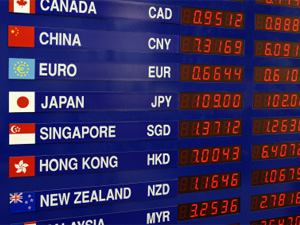Key Factors That Influence Foreign Currency Exchange Rates
Investors and traders should understand the key factors that influence foreign currency exchange rates, which have tremendous effect on stocks prices as well.
When determining one country's economic situation several indicators like BDP, interest rate, inflation and examined, among which exchange rate is playing a very important role.
Exchange rates determine the relative strength of global economies and play an important role in level of international trade the country is involved in. From the micro perspective, exchange rates are important for Forex traders and for long term stock investors with international portfolio also, since they determine the real return on the portfolio. Foreign currency exchange rates are therefore among most closely watched and analyzed economic data from people and organizations all over the world.
Before explaining which factors determine the value of foreign currency exchange rates you should understand how higher or lower rate influences nation's trading relationships with other countries. Expensive domestic currency makes domestic products and services more expensive for global markets and exporters don't like to see that, since their sales volume goes down. On the other side a more valuable domestic currency makes thing cheaper for importers on the foreign markets. Higher currency exchange rate will have a negative impact on country's trade balance (less export, more import), while lower exchange rate will have a positive impact on the nation's balance of trade (higher export, lower import).
5 Factors Influencing Exchange Rates
Exchange rates, which are expressed relatively as a comparison of currency values of two countries, are determined by several factors, which are all somehow related to each other and importance of these factors is a subject of many economic debates. Here are some of the principal determinants of foreign currency exchange rates:
Lower Inflation, Higher Currency Value
Lower inflation rate of one country compared to the other will have a positive impact on the currency value, since the purchasing power of this country will increase compared to the other country.
Higher Interest Rates, Higher Currency Value

Interest rates have high impact on both inflation and exchange rates. Interest rates represent one of the key tools of central banks for manipulating economic policy. In tough economic times central banks lower interest rates to make money more accessible to people, which will hopefully strengthen their expenditures. On the other side, lower interest rates are not that attractive to lenders as things might be in foreign countries; they move their lending facilities to other countries and cause the value of domestic currency to fall. In good economic conditions when interest rates are high, this attracts foreign lending capital and causes domestic currency to rise in its value.
Higher Current Account Deficit, Lower Currency Value
Nation's current account measures the trade balance between a country and foreign nations. It calculates all the payments between countries for goods and services sold and also financial net flows (dividends, interests). A deficit in current balance means that country is more buying/spending abroad then selling/earning abroad; to cover the deficit they need more foreign currency than it receives domestic currency, which lowers the exchange rate of domestic currency.
Higher Public Debt, Lower Currency Value
Nations do borrow money for financing large-scale projects in public sectors, like for example building highways. Such projects do stimulate domestic economy in one way, but higher debt makes the country less attractive to foreign investors at the same time. Country's debt is often paid of via money printing and inflation over the long-term. Worst case scenario is that the country goes default, not being able to pay off the debt.
Higher Political Stability and Economic Performance, Higher Currency Value
Institutional and also private foreign investors are looking to invest money in countries whit high economic and political stability. Many investment funds have a very strict investing policy written in their prospects regarding countries they are allowed to invest in. Higher country risk determined by rating agencies can have very negative impact on foreign investments.
Conclusion
As you can see there are many complex factors influencing foreign currency exchange rates. Whether you are a Forex trader or stock investors, it is good to have at least basic understanding of how currency values can play an important role on your portfolio real return.
Written by: Goran Dolenc
Do you find this content useful? Like! Tweet! Recommend! Share!
Back from Foreign Currency Exchange Rates to FX Online Trading
Back from Foreign Currency Exchange Rates to Best Online Trading Site for Beginners home page







